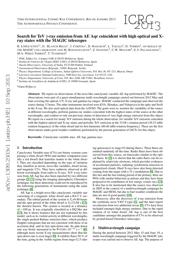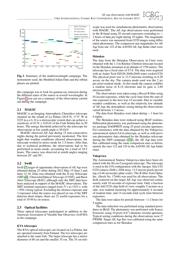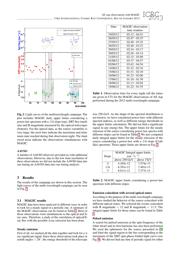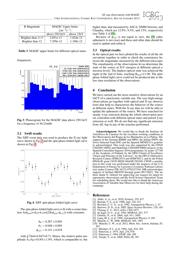Datasheet 搜索 > Microchip(微芯) > MIC4424CWM 数据手册 > MIC4424CWM 其他数据使用手册 1/4 页
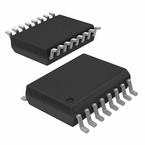
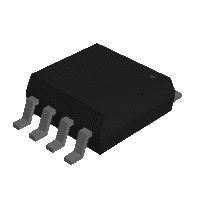 器件3D模型
器件3D模型¥ 5.026
MIC4424CWM 其他数据使用手册 - Microchip(微芯)
制造商:
Microchip(微芯)
封装:
SOIC-16
描述:
低边 MOSFET 灌:3A 拉:3A
Pictures:
3D模型
符号图
焊盘图
引脚图
产品图
MIC4424CWM数据手册
Page:
of 4 Go
若手册格式错乱,请下载阅览PDF原文件

33RD INTERNATIONAL COSMIC RAY CONFERENCE, RIO DE JANEIRO 2013
THE ASTROPARTICLE PHYSICS CONFERENCE
Search for TeV γ-ray emission from AE Aqr coincident with high optical and X-
ray states with the MAGIC telescopes
R. L
´
OPEZ-COTO
1∗
, O. BLANCH BIGAS
1
, J. CORTINA
1
, D. HADASCH
2
, L. TAKALO
3
, D. TORRES
2
, ON BEHALF OF
THE MAGIC COLLABORATION AND M. BOGOSAVLJEVIC
4
, Z. IOANNOU
5
, C.W. MAUCHE
6
, E.V. PALAIOLOGOU
7
,
M.A. P
´
EREZ-TORRES
8
, T. TUOMINEN
3
1
IFAE, Edifici Cn., Campus UAB, E-08193 Bellaterra, Spain
2
Institut de Ci
`
encies de l’Espai (IEEC-CSIC), E-08193 Bellaterra, Spain
3
Tuorla Observatory, University of Turku, FI-21500 Piikki
¨
o, Finland
4
Astronomical Observatory Belgrade, 11060, Belgrade, Serbia
5
Physics Department, College of Science, Sultan Qaboos University, P.O. Box 36, PC-123, Muscat, Oman
6
Lawrence Livermore National Laboratory, 7000 East Ave, Livermore, CA 95125, USA
7
Physics Department, University of Crete, P.O. Box 2208, GR-71003, Heraklion, Greece
8
Instituto de Astrof
´
ısica de Andaluc
´
ıa (CSIC), E-18080 Granada, Spain
*rlopez@ifae.es
Abstract:
We report on observations of the nova-like cataclysmic variable AE Aqr performed by MAGIC. The
observations were part of a quasi-simultaneous multi-wavelength campaign carried out between 2012 May and
June covering the optical, UV, X-ray and gamma-ray ranges. MAGIC conducted the campaign and observed the
source during 12 hours. The other instruments involved were KVA, Skinakas, and Vidojevica in the optic and Swift
in the X-ray. We also used optical data from the AAVSO. The goals were to: monitor the variability of the source
at different wavelengths, perform gamma-ray studies coincident with the highest states of the source at the other
wavelengths, and confirm or rule out previous claims of detection of very-high-energy emission from this object.
We report on a search for steady TeV emission during the whole observation, for variable TeV emission coincident
with the highest optical and X-ray states and periodic TeV emission at the 33.08 s rotation period (30.23 mHz
rotation frequency) of the white dwarf and its first harmonic (60.46 mHz rotation frequency). These are the first
observations under good weather conditions performed by the present generation of IACTs for this object.
Keywords: Cataclysmic variable stars, AE Aqr, gamma-rays.
1 Introduction
Cataclysmic Variable stars (CVs) are binary systems com-
prising a white dwarf (WD) and another companion (usu-
ally a red dwarf) that transfers matter to the white dwar-
f. They are classified depending on the type of variation
they manifest as novae, nova-like variables, dwarf novae,
and magnetic CVs. They have outbursts observed at dif-
ferent wavelength, from radio to X-rays. TeV
γ
-ray emis-
sion from AE Aqr has also been reported by two different
groups [
3
,
11
] using the imaging atmospheric Cherenkov
technique, but these detections could not be reproduced by
the following generations of instruments using the same
technique [8].
AE Aqr is a bright nova-like cataclysmic variable star
consisting of a magnetic white dwarf and a K4-5 V sec-
ondary. The orbital period of the system is
T
o
=9.88 hours
and the spin period of the white dwarf is
T
s
=33.08 s [
12
],
the shortest known. The system is located at a distance
of
∼
100 pc. It was originally classified as a DQ Her star
[
13
], but it shows features that are not explained by this
model, such as its violent activity at different wavelengths;
the single-peaked Balmer emission lines, which produce
Doppler tomograms that are not consistent with those of an
accretion disk, and its fast spin-down rate. Its spin down
rate was firstly measured to be
˙
P=5.64
×10
−14
s s
−1
[
6
],
although more recent X-ray measurements show that the
spin-down rate is even larger [9]. It exhibits flares 50 % of
the time, going in the visible regime from mag=12.5 (dur-
ing quiescence) to mag=10 (during flares). These flares are
emitted randomly all the time. Radio flares have been ob-
served from this source, on timescales similar to the opti-
cal flares. In [
2
] it is shown that the radio flares can be ex-
plained by relativistic electrons, which provides evidences
of accelerated particles, radiating synchrotron emission in
magnetized clouds. Hard X-rays have also been detected
coming from the target with a 33 s-modulation [9]. Due to
this fact and the fast rotating period of the primary, there are
WDs with similar behaviour as pulsars and they have been
proposed to be contributors of low energy cosmic rays [
14
].
It also has to be mentioned that the source was observed
in 2005 in the context of a multiwavelength campaign by
MAGIC and HESS, but due to bad weather conditions the
data are not of good quality [10].
Moreover, after the discovery of
γ
-ray emission from
the symbiotic nova V407 Cygni [
1
], and the later report
on emission from two additional novae [
5
], CVs have been
included amongst high energy emitters. Due to the rapid
rotation of its white dwarf, AE Aqr is one of the best
candidates amongst the population of CVs to be observed
by ground-based Cherenkov telescopes.
2 Multiwavelength campaign
During the period between 2012 May 15 and June 19, a
multi-wavelength campaign triggered by the MAGIC tele-
scopes was carried out to observe AE Aqr. The purpose of
arXiv:1309.2503v1 [astro-ph.HE] 10 Sep 2013
器件 Datasheet 文档搜索
AiEMA 数据库涵盖高达 72,405,303 个元件的数据手册,每天更新 5,000 多个 PDF 文件
